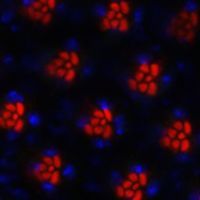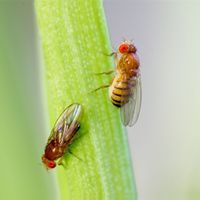Drosophila melanogaster

Scientists ID Heart-Damaging SARS-CoV-2 Protein
Grace van Deelen | Nov 22, 2022 | 3 min read
In flies and mice, a viral protein increases the rate of energy use by heart cells. But it’s not yet clear if the finding applies to humans.

New CRISPR Technique Causes Few Unintended Mutations in Fruit Flies
Jason P. Dinh | Jul 1, 2022 | 4 min read
A study finds that CRISPR-Nickase, which changes just one allele of a given gene, improves gene editing efficiency compared with CRISPR-Cas9.

Study Links Depression with High Levels of an Amino Acid
Dan Robitzski | Jun 14, 2022 | 5 min read
Experiments in animals and observations in humans suggest that the amount of proline circulating in one’s plasma has a strong association with depression severity.

Move Over Apoptosis: Another Form of Cell Death May Occur in the Gut
Natalia Mesa, PhD | May 18, 2022 | 6 min read
Though scientists don’t yet know much about it, a newly described process called erebosis might have profound implications for how the gut maintains itself.

Ana Marija Jakšić Shapes Fruit Fly Brains
Chloe Tenn | Apr 18, 2022 | 3 min read
The Swiss Federal Institute of Technology Lausanne evolutionary neurobiologist is using Drosophila to investigate how organisms adapt to novel environments.

Fruit Flies Evolve in Time with the Seasons: Study
Natalia Mesa, PhD | Mar 17, 2022 | 5 min read
Researchers find that evolution can operate on extraordinarily fast timescales.

Bacteria-Infecting Viruses in Gut Microbiome Linked to Cognition
Dan Robitzski | Feb 16, 2022 | 5 min read
Research in mice and flies suggests that bacteriophages, including those found in dairy foods, may have an influence on an animals’ ability to learn and remember information.

Epithelial Cell Signaling Helps Maintain Tissue Integrity
Annie Melchor | Nov 1, 2021 | 2 min read
Using a transgenic fruit fly model, researchers demonstrate how epithelial barriers are maintained in living organisms despite high levels of cell turnover and death.

Tumors Disrupt the Blood-Brain Barrier at a Distance
Abby Olena, PhD | Sep 9, 2021 | 4 min read
Shoring up the tissues that separate neurons and other brain cells from the circulatory system in fruit flies and mice can prolong life in the presence of a tumor.

Bacterial Infections Disrupt Flies’ Sense of Smell
Abby Olena, PhD | Jul 21, 2021 | 4 min read
The temporary loss of olfaction stops the flies from eating any more of whatever it is that made them sick.

Insects Pass Antiviral Immunity to Offspring
Abby Olena, PhD | Dec 17, 2020 | 4 min read
In both Drosophila and mosquitoes, protection lasts for generations following a single maternal exposure to positive-sense single-stranded RNA viruses.

Sex Promotes Lasting Memories in Female Flies
Ruth Williams | Nov 20, 2019 | 3 min read
A protein present in the ejaculate of male fruit flies activates long-term memory formation in the brains of their female partners.

Image of the Day: Poison Tolerance
Emily Makowski | Oct 3, 2019 | 1 min read
Genetically engineered Drosophila withstand toxins common in monarch butterflies’ diet.

Image of the Day: Fly Eye
Chia-Yi Hou | Jul 16, 2019 | 1 min read
See a developing Drosophila eye.

Artificially Intelligent Tools Capture Animal Movement
Carolyn Wilke | May 1, 2019 | 4 min read
Algorithms for motion capture help neuroscientists dig into the question of how the brain produces behavior.

Image of the Day: In the Eye of a Fly
Carolyn Wilke | Feb 26, 2019 | 1 min read
A missing microRNA leads to degenerating neurons and blindness in a fruit fly.

Image of the Day: Gut Bomb
Catherine Offord | Dec 10, 2018 | 1 min read
Microbial species living in a fruit fly gut interact with one another—and influence the insect’s health and longevity in the process.

Fruit Fly Geneticist Bruce Baker Dies
Diana Kwon | Jul 30, 2018 | 2 min read
The Stanford University professor was known for his work on sex determination and courtship in flies.

Fruit Fly Males Woo Females with Three Songs, Not Two
Abby Olena, PhD | Jul 26, 2018 | 3 min read
Researchers show that Drosophila melanogaster males are capable of producing more modes of courtship song with their wings than previously thought.
